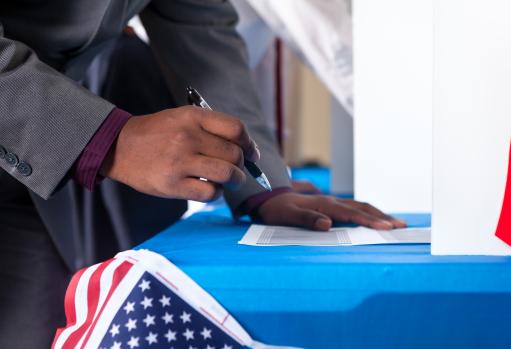The author, Miranda Oakley, 32, resides in South Kingstown, Rhode Island.
We have a huge election coming up in November, and it would be a shame if I couldn’t vote because of health concerns. With less than 100 days until America votes for President, I’ll be left out unless something changes quickly. I’ve been blind my entire life, and I live with my mother and grandmother.
We’ve been closely following social distancing guidelines to protect ourselves and the elderly people my mother works with. The sooner we follow the rules, the better chance we have of beating COVID-19.
Although I've voted in-person in years past, I want the option to vote-by-mail in November to avoid unnecessary exposure to the virus. Going to a polling place this year isn't an option. Not only would I have to wait in line with other voters and interact with poll workers to assist me, I need to touch many surfaces to get from place to place. Additionally, my mother would have to risk the lives of her elderly clients to take me to the polls.
Sometimes people think that disabled people don’t care about having or aren’t able to have a voice in politics. But voting is important to me; it’s something that should be practiced by everyone, whether they are male, female, able-bodied, disabled. And it is especially important for me to vote to ensure that the disability community is represented in politics.
So what is stopping me from casting a ballot from the safety of my home? Many states have made reasonable accommodations for voters without sacrificing the security of elections. Mine hasn’t.
Restrictive Witness Requirement
My home state of Rhode Island imposes a requirement that people who wish to vote by mail have two witnesses or a notary sign their ballot envelope, even amid a highly contagious and deadly pandemic. These requirements necessitate face-to-face and hand-to-hand interaction between voters.
If I am forced to get a witness, I likely won’t be able to vote. Many states have voluntarily eased voting restrictions during the pandemic; however, Rhode Island hasn’t followed suit. I don’t know why it has put its voters in this situation.
Joining the Fight for a Legal Solution
That’s why Campaign Legal Center (CLC) and the American Civil Liberties Union are turning to the courts to solve this problem and have sued the state on my behalf. I am a plaintiff in the case along with two other voters with disabilities because it’s important to speak out.
If this law isn’t changed, it would be devastating. It has the potential to disenfranchise a lot of people. Rhode Island is small but mighty. More than 125,000 Rhode Islanders live alone, and of those, over 50,000 are 65 years and older and are therefore at significant risk of serious health complication if they contract COVID-19.
Countless others live with no more than one other adult who can serve as a witness and would need to interact in close proximity with someone outside their household to be able to comply with Rhode Island’s law. I want to vote like people in other states, so I can advocate for change. People should not have to risk their lives or the lives of others to vote.


